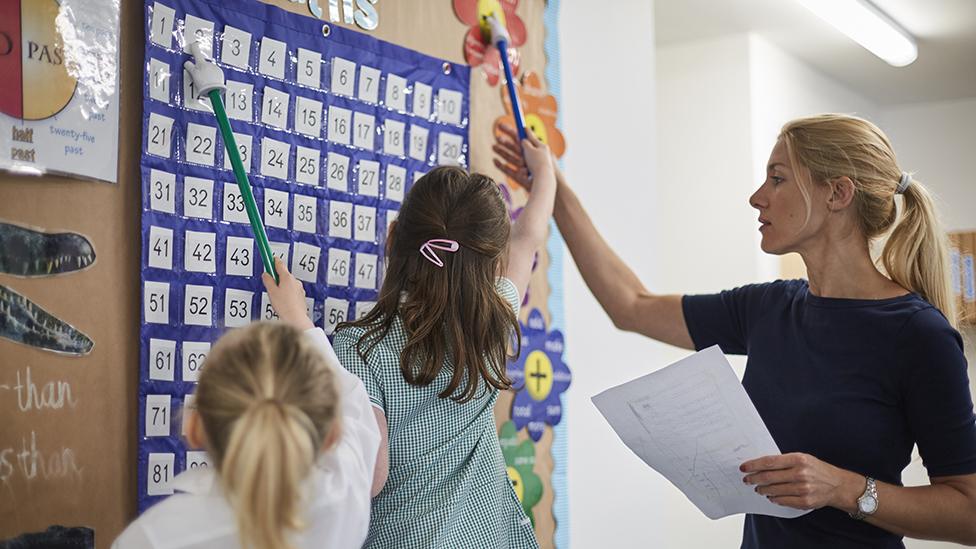How could children make up for lost school time?
- Published

With children in England back in the classroom, teachers face the massive task of making up for months of missed learning.
A £720m package has been announced to help pupils in England catch up - although teachers' unions say more is needed.
Here are some of the measures which could be used to help pupils.
1. Summer schools
The government has asked schools to consider offering face-to-face learning over the summer holidays this year.
It is to provide £200m to secondary schools to fund summer classes for pupils who need it most, especially those children moving up to Year 7.
Summer schools with qualified teachers leading small groups can help children make up to four months of academic progress, according to the Education Endowment Foundation (EEF).
They need a strong academic element, chief executive Becky Francis says, although sporting and other fun activities can also contribute to children's emotional wellbeing.
She adds: "Staffing summer schools will be a challenge because of burnout among teachers."
The government's education catch-up tsar, Sir Kevan Collins, has said that the idea of summer schools has "promise".
And Welsh Education Minister Kirsty Williams said she was "willing to discuss all possibilities" for keeping schools open over the summer.
However, evidence suggests that disadvantaged pupils, who would benefit the most, are less likely to take up the offer.
Two summer school trials run by the EEF saw less than 50% attendance among students in the target group.


How much money has been promised?
In England, £1.7bn of funding has now been made available for catch-up programmes
In Scotland, the administration has promised £127m in funding to help disadvantaged pupils
Tens of millions of pounds have also been put into catch-up schemes in Wales and Northern Ireland

2. Weekly tutoring sessions
One-to-one tuition is seen as a proven method of helping children catch up.
Weekly sessions could help a student make three to six months of academic progress, with particularly large gains in literacy and numeracy among primary-school pupils, according to four recent UK studies.
The government is pledging money to an expanded National Tutoring Programme (NTP) for primary and secondary pupils, and an extended tuition fund for 16 to 19-year-olds.
More than 100,000 disadvantaged pupils have accessed the service since it began, in November.
But the NTP has largely offered online tuition since January, and many of the tutors are university students.
Prof Lee Elliott Major, from the University of Exeter, who first proposed the scheme, early last year, says: "The evidence is thin about tutoring done online not by professionals.
"So the exact impact of the NTP is unclear at the moment."
3. Repeating the school year
The practice of retaking a whole year is common in some countries, such as Germany and the US, but rare in the UK.
The Education Policy Institute (EPI) think tank has suggested it could help pupils whose education has fallen behind.
But the Association of School and College Leaders says the idea would be practical for a small number of students only.
Large-scale repetition would create "a log-jam in the system" and have huge knock-on effects on funding for universities.
The EEF estimates it would cost £6,000 per pupil per year in England.
And pupils who repeat a year make an average of four months' less academic progress than those at a similar level who continue on to the next school year, research suggests.
4. Extending school days
Disadvantaged pupils can benefit from longer school days, US research suggests.
And Robert Halfon, who chairs the Education Select Committee, told BBC News he had suggested the idea as "a serious solution for the government to consider" in England.
The extra teaching time could be provided by "civil society instead of teachers", he says.
After-school clubs cost about £7 a session, the EEF estimates., external
But adding two extra weeks of school time a year would cost £260 per primary pupil and £360 per secondary pupil.
5. Increased wellbeing support
There have been calls for extra funding for mental health support for schoolchildren, to help ease their return to the classroom and improve their chances of catching up.
Teaching staff trained to improve emotional wellbeing can help pupils make substantial attainment progress, EEF research suggests., external
And the EPI has proposed £650m of extra funding for additional school staff and in-school counselling programmes in England.
"Remedial wellbeing work will be necessary to achieve [academic] catch-up," it says, particularly for disadvantaged pupils.

- Published1 July 2022

- Published23 February 2022
